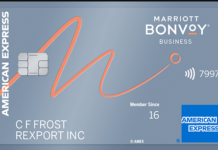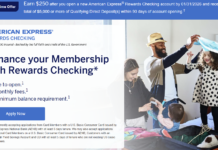NOTICE: This post references card features that have changed, expired, or are not currently available
As points-based programs devalue, more and more it makes sense to consider collecting cash instead of points. I first brought this up a year ago with the post “Giving Cash its Dukedom“. Since then, many points programs have increased award prices and many points collectors are wondering whether cash may be a better option.
I’m not going to give my opinion, in this post, of whether you should collect points or cash, but I will list some of the best current deals available for getting cash instead of points…
5% (or more) Everywhere
There are a number of credit cards that offer 5% (or more) cash back within certain categories:
- Amex Blue Cash Preferred. 6% Cash Back at Supermarkets, up to $6K spend per year
. - Wells Fargo Cash Back card. Currently offering 5% cash rewards on gas, grocery, and drugstore purchases for the first 6 months of card ownership.
- Chase Ink business cards. 5% cash back (5 points per dollar) for office supplies, phone, cable, and internet charges. Signup bonuses range from $200 (20K points) to $500 (50K points). Even though it is often possible to get better than 1 cent per point value from Ultimate Rewards, keep in mind that these points can be converted directly to cash if you so choose.
- Amex SimplyCash business card. 5% cash back at U.S. office supply stores & on wireless telephone services.
- Citi Dividend Platinum Select. Rotating 5% categories, up to $6,000 in spend per year.
- Chase Freedom. Rotating 5% categories, up to $1500 in spend per quarter. When paired with a Chase checking account, you get an additional 10% annual bonus (i.e. 5% cash back becomes 5.5%).
- Discover It. Rotating 5% categories, up to $1500 in spend per quarter. Currently there is a $150 signup bonus available.
- SallieMae World MasterCard. 5% cash back for gas (up to $250 spend per month); 5% cash back for groceries (up to $250 spend per month); and 5% cash back for books (up to $750 spend per month).
- US Bank Cash+. 5% cash back (up to $2000 spend per quarter) in two categories that you select from list of available categories (department stores, charities, furniture stores, hotels, etc.).
2% (or more) everywhere else
A number of credit cards offer 2% or better returns for all spend. Here are some of the best:
- JCB’s Marukai card for Hawaii and California residents. This card offers 1% cash back on your first $1K of purchases, 2% cash back on the next $1K of purchases, and 3% cash back thereafter each year. Earn an addition $50 bonus when you spend $5K or more yearly. This card acts like a Discover card, but is not necessarily accepted everywhere that Discover cards are accepted so don’t expect to rely on this card for all purchases. Limited to residents of Hawaii, California, Nevada, Oregon and Washington. $15 annual fee + $10 annual membership fee.
- Fidelity Investment Rewards American Express. 2% cash back everywhere. No annual fee.
- Capital One Spark Business Card. 2% cash back everywhere. $59 annual fee.
Note that the above cards are limited to those that reward you with cash. Some cards have similar benefits when you use rewards to pay for travel. These include the Barclaycard Arrival World MasterCard (2.2% towards travel), BOA BankAmericard Privileges with Travel Rewards (2.2% towards travel if you pair with a qualifying B of A account), CapitalOne Venture Rewards (2% towards travel), and Discover Escape (2% towards travel).
5%, 10%, or more, online shopping
Online shopping portals offer a terrific way to get extra cash back (in addition to credit card rewards) when shopping online. Often, cash back rates are better than points or mile earnings on other portals. I recommend using CashBackMonitor to find the best cash back or points rates for the merchant you want to shop with.
Here’s a brief overview of some of the best cash back portals:
- The ShopDiscover portal often has the best cash back rates. If you shop often online, it could be worth getting a Discover card just to get access to this portal.
- The uPromise shopping portal also often offers the best cash back rates. Where it goes from good to great is when you pair it with the uPromise World MasterCard. By paying with this MasterCard when shopping through the uPromise portal, you’ll earn an additional 5% cash back for those purchases. So, when the uPromise portal offers 5% cash back for a given merchant, you’ll earn a total of 10% cash back if you pay with the uPromise credit card. You can sweeten the pot even more by throwing in a SallieMae savings account to get a 10% annual rewards bonus (e.g. 10% in rewards will become 10% bigger and add up to 11%).
- Chase’s Ultimate Rewards Mall often has the best rates for certain stores. Specifically, look to get 10% cash back for shopping at Kohl’s.
- While BigCrumbs doesn’t usually have the best cash back rates, they do have a very well run portal. And, it has a multi-tiered referral program in which you can earn cash back from purchases made by people you refer and from people they refer.
- TopCashBack often has great cash back rates. Many readers have complained about issues with using this portal, but I’ve had very few problems.
2% (ish) cash back for buying money
Both BigCrumbs and TopCashBack currently offer 2% cash back on purchases of American Express gift cards. Buy cards with the highest value in order to reduce fees and shipping as a percentage of the total. Cash back rates vary regularly, so check current rates before you buy.
Business card rewards
Visa, MasterCard, and American Express all have small business rewards programs in which you can earn cash back for purchases made at certain merchants in addition to cash back earned from your credit card rewards or from portals and other sources. The business rewards programs are:
- American Express Open Savings: When you have an American Express small business card, you are automatically enrolled in this program. Get cash back from spend at Hertz, Hyatt, and more.
- MasterCard Easy Savings: You must register each of your business MasterCards to qualify for these savings. Get cash back from spend at Budget, Avis, and more.
- Visa SavingsEdge: You must register each of your business Visa cards to qualify for these savings. Get cash back from spend at Ramada, Alamo, Wingate, and more.
And many more
Of course, there are countless additional ways to earn cash instead of points and miles, but I think the above is a good start.





Hi
I have a question regarding the benefit of Amex simplycash through OPEN network. They have a 10% back on shopping online at hp.shopping.com. I am wondering if I go through an ultimate reward portal and then use my amex simplycash there, will it earn a 10% credit back? any ideas?
Yes, that definitely should work.
Thanks a lot for the quick response. i will give it a try.
[…] Miler had a great post summarizing all the ways you can be “Cashing in“. I can imagine any other blogger linking this baby to the point your screen turned blue. Not […]
When going for cash for hotel stays don’t overlook the room taxes that you have to pay or if you book through American Express Travel or Ultimate Rewards compared to loyalty points programs.
I think we’d all love for our miles to be devalued as slowly as cash is, with inflation currently less than 2% per year. I doubt the long-run prospects for holding miles are as good as holding cash. That being said, it’s not like you can’t put cash back you earn into an investment which will outperform inflation. There are many. You can even buy gold if you’re a goldbug like the author of the article you linked, although you’ll probably do worse in the long run than if you had bought an S&P 500 index fund.
And this is a bit off-topic for this blog post, so FM, feel free to edit what follows out of this comment or delete it if that’s not possible, but there are good reasons to have a small amount of inflation. The purpose of money isn’t to make people who hold money richer, it’s to facilitate trade (money is really just a more efficient way of bartering) and make society as a whole richer. Too much inflation undermines the purpose of money, but 2% a year is well within the healthy range. If cash under the mattress held its value indefinitely or increased in value over time (deflation), there would be less incentive to engage in productive activities. So long as there is economic growth, there will be investments that allow people who have wealth to increase their wealth over time.
Guess what else devalues over time? That’s right. Cash.
http://www.forbes.com/sites/charleskadlec/2012/02/06/the-federal-reserves-explicit-goal-devalue-the-dollar-33/
Re: Both BigCrumbs and TopCashBack currently offer 2% cash back on purchases of American Express gift cards…..is it true that Chase is now coding these as cash advance (haven’t made a purchase since late summer, which worked fine)? Also, any recent confirmations on BOA coding these on their mileage debit as purchase vs. cash?
That was y/e not y/zero, darn auto correct!
One slight correction. The bofa privileges is a 2.1% card for qualifying accts as the bonus of 10% at y/zero is on net purchase not on points earned.
I start to ask the same question about cash-back options lately …
Cash rebate is not taxable. Redeeming sign-up bonus points is for the amount over $600. 30% tax is not what I want to pay For sign-up bonus, definitely do not them as cash.
I ask myself, do I prefer to receive $500 cash back from $10,000 expense (if 5% cash-rebate), or to use these expense to earn 100,000 card sign-up bonus points? I still prefer the latter, if I like travel. If no travel, certainly cash-back.
For example, $5000 for SPG 30,000 points, $2500 for VA 50,000 points ( or x2 = 100,000 Hilton points = 3 nights Hilton hotel) with $95 fee, $1000 for Citi Visa Hilton 50,000 points. If staying four nights at the same Hilton hotel, fifth night is free. total expense $8500 and cost $95 fee.
Two years later, if more devaluation, I may switch side if Math makes sense. just my 2 cents.
You have a good point here: As long as your spend goes towards earning a signup bonus, you’re probably better off than with even 5% cash back rewards. Of course, sometimes you can earn both at once: e.g. buy something through a cash back portal, but pay with your SPG card in order to reach $5K spend.
The $600 threshold is just for getting a 1099-MISC. It doesn’t affect whether something is taxable or not. If you receive less than $600, you’re still supposed to report it on 1040 line 21 or Schedule C if it is taxable.
That being said, signup bonuses could be looked at as a rebate, since you usually have to spend money to get them. You are getting a “rebate” of 50,000 miles on the first $2k of purchases you make on a card or whatever. That being said, signup bonuses are generally much more generous on miles/points cards than cash back cards. My own preference is to churn signup bonuses for my miles and put most non-category spending on my grandfathered 2% Priceline Visa or JCB Marukai cards.
Same disclaimer as above applies, I’m not a tax professional, this post isn’t legal or tax advice, and you should consult a CPA or attorney about your own tax situation.
Has anyone applied for the Wells Fargo Cash Back card? Do they require you to have a checking account or some banking relationship with them?
Also, if you do have the card, how do they handle big spends/MS like we do on Chase or Citi TYP card?
I believe that Nick@PFDigest applied for and got the Wells Fargo card without doing any business with WF. I can’t answer the second question.
I’ll take whatevers easiest to greater value out of.
Penfed also has 5% cash back on gas. The best part is, they automatically apply the reward to your statement credit, so you dont even need to do any extra work. Just setup the account to auto-deduct from your bank account, use the card at gas stations, and profit. Dont plan on manufacturing spend though, as only actual gas purchases get cash back.
Also note they recently changed the TOS where you have to have a qualifying product to get the 5% cash back no annual fee version. Just open a money market account, and you qualify. The CSR also told me, once you open the money market, as long as you have 1 cent in it, you qualify.
I thought that PenFed recently reduced the cash back rate at gas stations to 3%. Have I mixed up different PenFed cards?
Yes and no. Penfed now has 2 cards. A useless one that charges $25 a year and only gives 3% cash back on gas, and the good one, that still gives 5% cash back on gas, with no annual fee.
The catch is now you have to have a qualifying Penfed product to have the 5% card. The easiest qualifying product is a money market savings, which you can fund with a credit card (up to $100) then transfer all but 1 cent out of, to continue to be qualified for the 5% no annual fee version. Sure its a little bit of setup work, but more then worth it IMO, especially if you commute.
The two cards and their breakdown can be found here: https://www.penfed.org/Platinum-Cash-Rewards/
Thank you, Jonathan! I have the penfed card & got its email notice about gas cashback going from 5 to 3 percent. No email was received about “cash rewards plus” or how to retain 5%. Thanks for the web link and info.
Hi FM, Do you have to pay income tax from cash back cards? That would cut into the benefits.
@Mary Jane – as long as the bank doesn’t send you a 1099, you should be fine. Having said that, CITIbank has been notorious in the past for sending these little goblins…
There’s no difference from a tax perspective whether you receive cash back or points/miles. Points/miles would be taxed at their fair market value, if taxable. In the case of miles, you may be worse off, because the bank may overvalue them, like Citibank sending out 1099s valuing miles at 2.5 cents each.
The question is the source. Generally credit card rewards are considered rebates, which are not taxable as they are considered a discount on the purchase price of the items you buy with the CC rather than income. Whether that applies to manufactured spending, as opposed to regular purchases, is a bit of a grey area, which to my knowledge the IRS has never addressed specifically, but you won’t get a 1099 for credit card rewards whether they are cash or miles. If you buy items for resale, though, any rebate you receive, including CC rewards, reduces your cost basis in the item. On the other hand, rewards for opening a bank account, whether they come in the form of miles or cash, are considered interest, which is taxable, and you’ll get a 1099. That’s where the infamous Citi 1099s have come from. Whether or not you get a 1099 does not determine whether or not a payment is taxable income or not, though, so consult a CPA or attorney about your own tax situation. I am neither and this post is not legal or tax advice.
Lemma, that was a fantastic answer to the tax question! I might republish your comment in a blog post if that’s OK with you.
FM: Sure, but make sure you include my disclaimer. I’m not a tax expert and I don’t want your readers to take my post for anything more than it is.
I’d strongly recommend anyone who’s been on the fence about Amex BCP to get in while the getting is good. 6% cash back on groceries (which I can’t believe is a category anyone would be comfortable paying interest on) can’t be sustainable in the long run, even with the annual fee. My guess is that the marketing department at Amex came up with this as a way to increase their market penetration with grocery stores, which they’ve historically had very little presence in. Then, after a couple years when they’ve taken significant market share, start throttling back the cash back rate.
Last year they added the $6K per year cap to limit their exposure. So, I don’t think that the card is in much danger of being taken away or devalued again soon. Of course, I could be wrong.
Citi Dividend is another 5% quarterly, with a perk that they will let you use the $6K cap in whichever quarter you wish vs 1,500 per quarter. IIRC last year had Q1 drugstores, which made for an easy $300. Just yesterday I converted an old TY card, and regrettably the conversion w/Citi takes 51 days (CARD Act says 45 days min, but maybe its procedure or biz days), so my conversion date is 1/2/14. I was hoping to get a few days in 2013 to rack up 5% spend.
Thanks for the reminder! I meant to include the Citi Dividend card in this post, but I forgot. Oops! I’ll update the post. (updated)
I think I’m going to officially switch from my Chase Sapphire basic card with my old Citi forward pre-student card for restaurant purchases. 5% cash back > 2 UR points 🙁